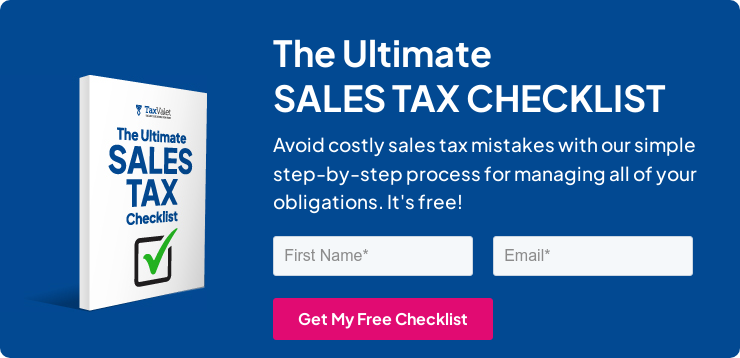Every year, July 1 and January 1 bring a wave of state sales tax rule changes—from updated nexus thresholds to new exemptions and shifting tax rates.
If you didn’t realize July 1, 2025 sales tax changes just went into effect, you're not alone. Many businesses miss these critical compliance triggers—and that silence might not be a good sign.
If no one flagged these updates for your business, or if you're unsure whether they apply to you, this article is for you. We’ll explain why July 1 matters, what changed this year, and how to evaluate whether your current compliance setup is putting your business at risk.
Why July 1 (and January 1) Are Critical for Sales Tax Compliance
State legislatures pass tax law changes throughout the year—but most are set to go live on one of two dates: July 1 or January 1.
These sales tax changes often include:
- New or adjusted economic nexus thresholds
- Changes to product and service taxability (like exemptions or new inclusions)
- Updated sales tax rates at the state, county, or city level
- Rules affecting remote sellers and marketplace facilitators
Even subtle updates can affect whether you need to collect tax, adjust your tax compliance software, or file differently—and not catching them could lead to miscalculations, customer issues, or audit exposure.
July 1, 2025 State Sales Tax Changes: What Your Business Needs to Know
Here are just a few of the sales tax changes that went live on July 1, 2025:
- Utah removed the transaction count requirement from the economic nexus threshold
- Idaho created a sales tax exemption for small sellers
- Maryland added a 3% sales tax to certain data and information technology services
- Mississippi reduced the sales tax rate for groceries to 5%
- Colorado reduced the retail delivery fee to $0.28
- Minnesota increased the Cannabis Tax rate to 15%
If your business sells into these states, these changes could impact your nexus status, tax calculation accuracy, or exemption handling.
Have you made the appropriate updates to your tax settings, permits, and filing strategy?
If not—you could be overcharging customers, under-collecting tax, or exposing yourself to audit risk without even knowing it.
What Happens If You Miss a Sales Tax Change?
If no one is actively watching for sales tax rule changes that affect your business, your system can quickly fall out of sync.
You might be:
- Under-collecting tax, putting you at risk during an audit
- Overcharging customers, creating refund and reputation issues
- Continuing to maintain permits unnecessarily, increasing cost and complexity
If you're relying on software, your accountant, or DIY research to catch updates, you could be missing important changes.
What TaxValet Clients Experience Instead
TaxValet’s full-service clients don’t have to worry about July 1 or January 1. We do the monitoring, analysis, and follow-through for you.
Here’s what happens behind the scenes:
- Monitor: We track sales tax legislative updates across all U.S. states and cities.
- Filter: Our compliance team identifies which changes actually affect our clients.
- Match: We determine which clients are impacted based on nexus, permits, product types, etc.
- Take Action: We update your tax settings, file closures where needed, and test your tax engine to ensure accuracy.
We even test your setup to ensure that your customers are being charged the right tax at the right time.
And we do all of this proactively, behind the scenes.
✅ No guesswork
✅ No checklists for your team
✅ No waking up to notices, fines, or “oh no” moments

July 1 Compliance Checklist (If You’re Not with TaxValet)
If you're managing sales tax compliance yourself or using software without oversight, here are key questions to ask:
- Did any states you sell into change their nexus thresholds?
- Have your tax rates or exemptions been affected?
- Are your permits still required—or now optional?
- Is your tax calculation engine updated and accurate?
If you don’t have clear answers—or haven’t reviewed these in the last few days—you could already be out of compliance.
No More Surprises from State Tax Rules
Sales tax rule changes are more than bureaucratic noise. They’re legal requirements that can trigger new obligations—or relieve old ones—overnight.
But if you’re working with TaxValet, you don’t have to worry about what changed. We’re already on it.
Got questions about how state changes impact your business? Let’s talk.
FAQs About July 1, 2025 Sales Tax Changes
What are the July 1, 2025 sales tax changes?
Several states implemented new tax rules on July 1, including updated nexus thresholds and rate changes. See the section above, titled ‘July 1, 2025 State Sales Tax Changes: What Your Business Needs to Know’.
What happens if I miss a sales tax rule change?
You might over- or under-charge tax, file incorrectly, or remain registered in a state unnecessarily—all of which increase audit risk and complexity.
Why are July 1 and January 1 so important?
These are the most common effective dates for state-enacted tax laws to go live—especially changes passed earlier in the year.
How can I stay on top of future tax rule changes?
Working with a proactive partner like TaxValet ensures you’re covered year-round—without needing to monitor every legislative update yourself.

Disclaimer: Our attorney wanted you to know that no financial, tax, legal advice or opinion is given through this post. All information provided is general in nature and may not apply to your specific situation and is intended for informational and educational purposes only. Information is provided “as is” and without warranty.
What you should do now
- Get a Free Sales Tax Plan and see how Tax Valet can help solve your sales tax challenges.
- Read more articles in our blog.
- If you know someone who’d enjoy this article, share it with them via Facebook, Twitter, LinkedIn, or email.
